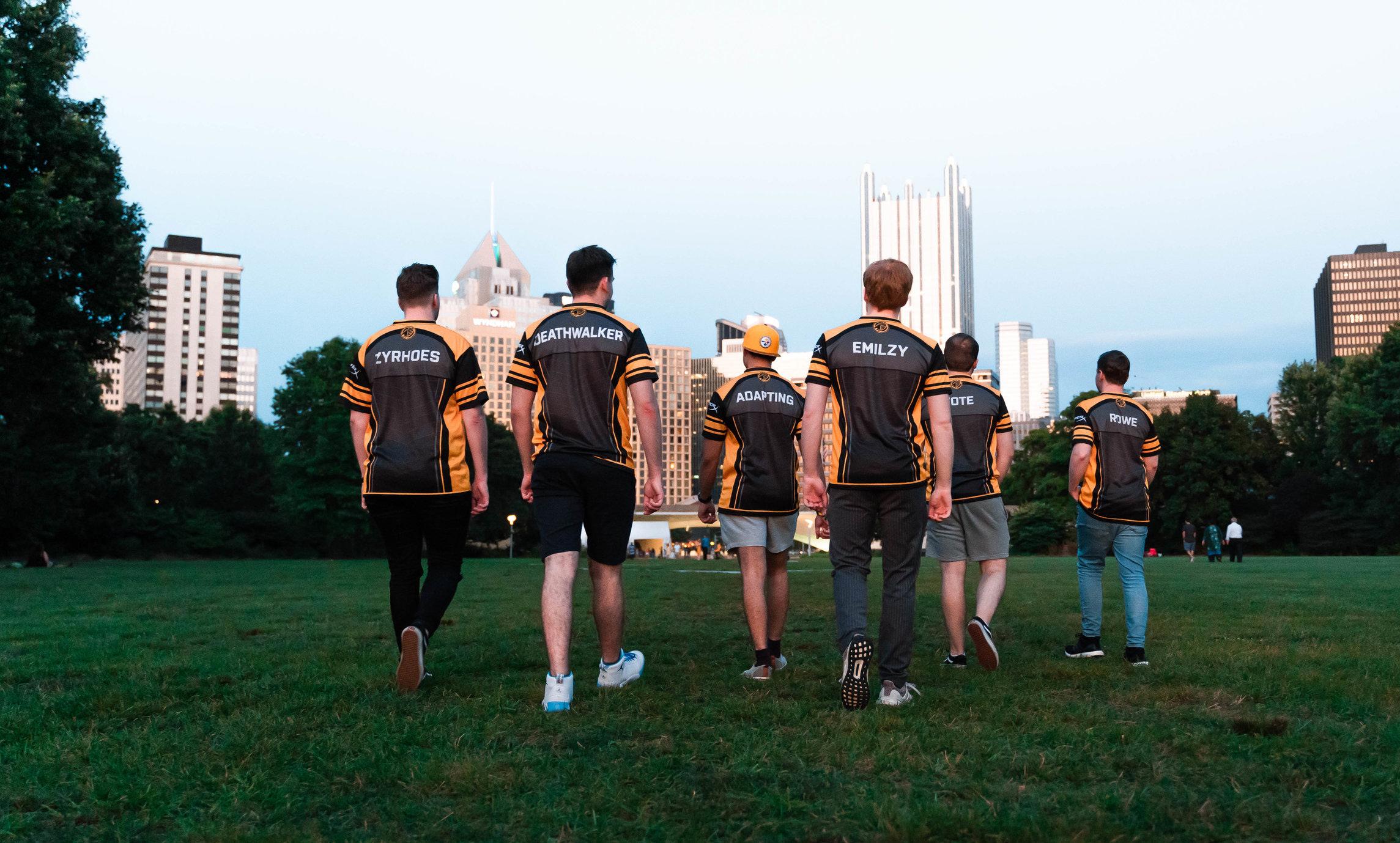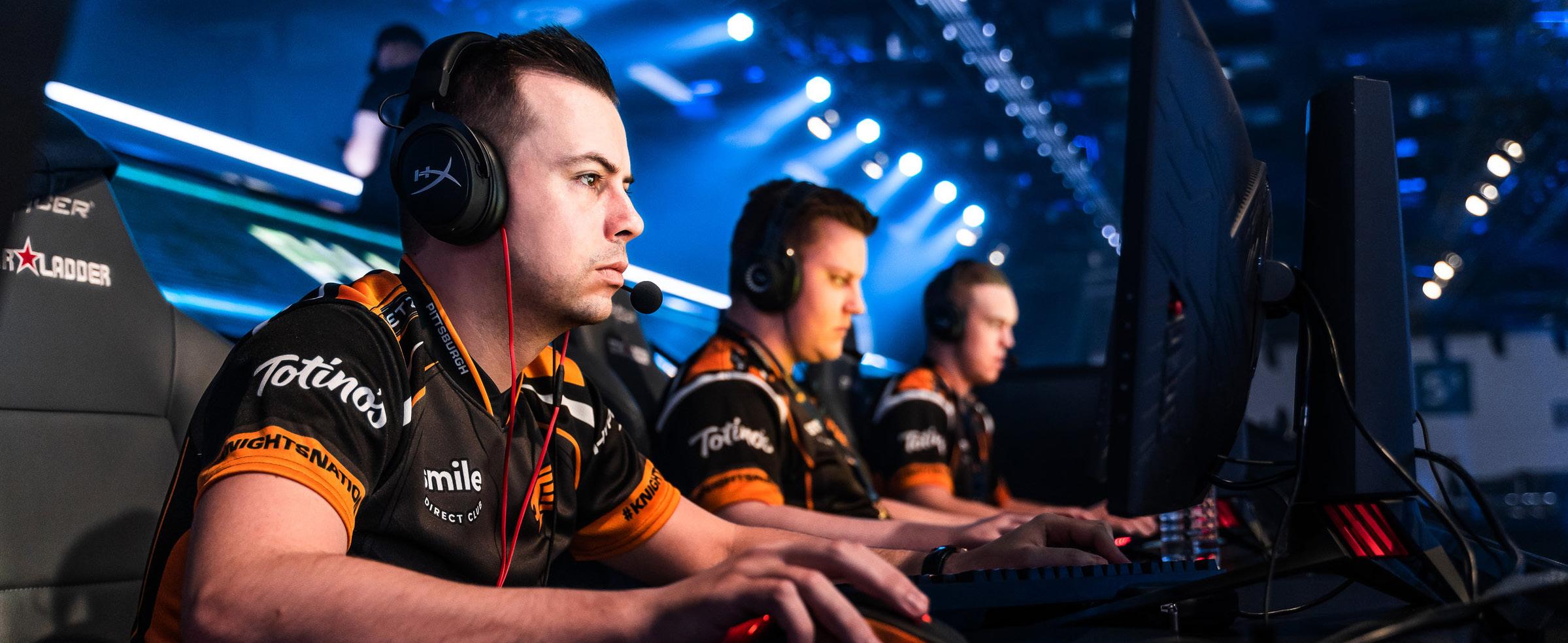
5 minute read
The Game is Still On
GAME STILL ON WHILE OTHER PRO SPORTS ARE HUNG UP BY COVID-19, THE PITTSBURGH KNIGHTS ARE GOING STRONG
Before the COVID-19 pandemic, The Pittsburgh Knights, a local esports franchise, were coming up with a schedule that would last from May through the end of the year, which included a slew of in-person tournaments as well as events at spaces like Stage AE. “Obviously, that landscape has completely changed,” says the franchise’s CEO James O’Con- nor.
Advertisement
The pandemic has put tradi- tional sports on hold around the country, but competitive video games still have a path to con- tinue through the internet. As O’Connor puts it, “you can’t play baseball from home.” During the pandemic, the Knights have lost important revenue from the loss of in-per- son events but have a lot to gain from huge bumps in viewership for online tournaments. Around the world, gamers have been playing and watching video games much more than before the pandemic. Far more eyes are now on Twitch, the pre- miere place for both casual and professional gamers to stream gameplay. Traffic for online es- ports tournaments have surged, and the Knights are certainly seeing that. At first glance, this is promis- ing for esports, an industry that has been striving toward the prominence of sports like base- ball and football through video games like Overwatch, Count- er-Strike and League of Legends. However, the business model for esports has traditionally relied on in-person tournaments. About a quarter of the Knights’ revenue was anticipated to come from in-person events this year, according to O’Connor. These
BY MATT PETRAS - PITTSBURGH CURRENT CONTRIBUTING WRITER INFO@PITTSBURGHCURRENT.COM
Despite, a global pandemc, the Pittsburgh Knights Esports franchise is still making waves worldwide.
also serve as marketing oppor- tunities for the game developers and the teams. For players, missing out on tournaments can also simply be a bummer. Garett Bambrough, the esports consultant for the league, played Counter-Strike competitively with and against O’Connor years ago and can attest to the joy of an in-person tournament.
“Just being able to be in an- other country and compete, in front of a live audience and so on and so forth, that’s the best part of being a pro gamer, to be honest with you,” Bambrough says. “And that part’s been taken away.” There’s also additional fun in watching the players as they win and lose throughout an in-per- son tournament.
“You see them get loud and ex- cited and pumped up, or you see them get sad and depressed. And fans like to see the experiences of the players as it’s happening,” Bambrough says. “But online, you don’t get to see those peo- ple’s expressions at all.” It’s not standard practice for esports players to have camer- as streaming them as they play in a tournament, which means that the sponsor-clad jerseys aren’t visible during online tournaments. Getting a camera on every player would be costly and require a lot of behind-thescenes work to get players a properly set up camera. It’s also an addition that makes some players uncomfortable, accord- ing to Bambrough. “For a lot of teams, they’re not cool with that,” Bambrough says. “They don’t want that.” Even before the pandemic, the Knights tried to give their fans some window into the players’ reactions and conversa- tions during online tournament gameplay. The league has a video series called “Rocket League Comms Chaos,” for example,
which features compilations of gameplay clips with the players’ audio attached as they commu- nicate with each other through audio. O’Connor believes that the Knights’ business model, in particular, is well-suited for a transition into online-only com- petition, partly because much of their competing was already online.
“We’re not sitting here and say- ing ‘oh no, our team isn’t going to the finals anymore in a certain city or Chicago or wherever to a live event, and our sponsors aren’t being represented’ because we’re doing online tournaments,” O’Connor says. They’re also doing online events like the Valorant Charity Invitational, which Sheetz and G FUEL sponsor. Players compet- ed to raise money for protective equipment and other medical supplies to combat COVID-19, playing the new game Valorant. This new game has been making enormous waves in the competitive gaming community, bringing in ludicrous amounts of online viewers. It garnered 1.73 million concurrent viewers on Twitch, the second-most in his- tory, when its early, pre-release version launched this month, according to ESPN. To put this in perspective, the only game to ever surpass this, League of Legends, a game that’s been an esports smash hit for years, did so last year in a global tourna- ment. “As messed up as this may sound, the fact that the game came out during the virus might have helped them,” Bambrough said. “Because everyone’s at home. Everyone’s online.” It makes sense that players and viewers alike are enjoying the game, as it’s more or less a combination of two of the most popular competitive games right now, Counter-Strike and Over- watch, and it’s developed by Riot Games, who created League of

The Pittsburgh Knights in action. Above at a tournament and below playng a game of Madden with NFL star Ryan Shazier.
Legends. It is a five-vs-five shooter that generally plays a lot like Count- er-Strike, an intense and techni- cal first-person shooter, but with a slew of different characters with their own unique abilities, a concept popularized in esports by Overwatch. And it’s phenom- enal, Bambrough says. “We’re very curious to see how this game is going to evolve over the next year or two, because the strategies you can do in this game are endless because the abilities add another layer that Counterstrike doesn’t have,” Bambrough says. The power wielded by this game means that the Knights are keeping a close eye on the game and calculating how they’re go- ing to play it. “This game, we feel for sure it’s going to be successful, we’re just waiting to see how it devel- ops, and we’re going to go from there,” Bambrough says. “We’re going day-by-day with Valorant for sure.” So in some ways, what the Pittsburgh Knights and other esports teams have been doing has largely been similar to what they did before the pandemic. The same players are playing the

same games, though there are new challenges for the business of the industry as it learns to for- go revenue and marketing from in-person events and lean into the new eyes paying attention to online tournaments. “I can tell you that our phone is off the hook, and it’s com- pletely different,” O’Connor says. “Honestly, it’s sad that it’s hap- pened right now. It’s a concern for everybody. I hope everybody is safe. It’s highlighted our work, and we’re just trying to do a good job in that light.”










